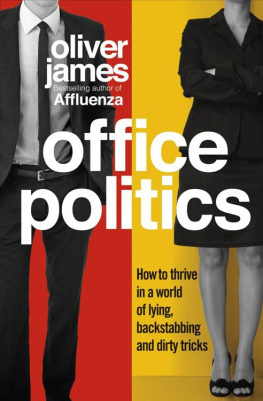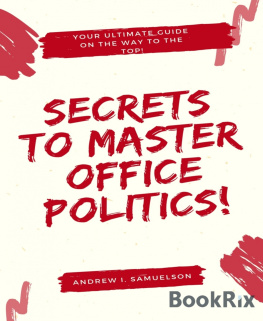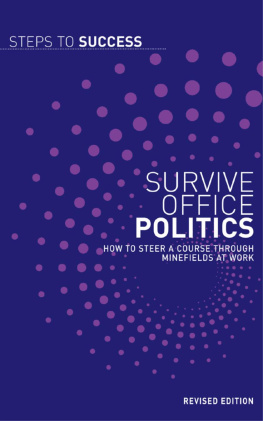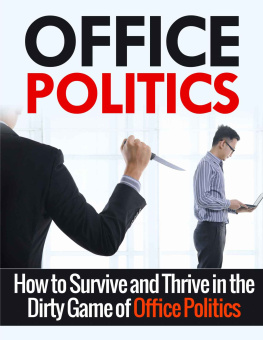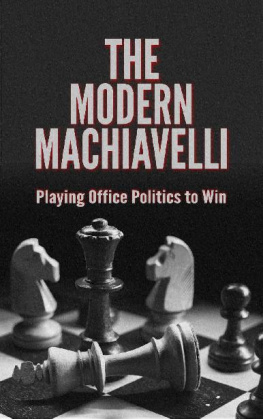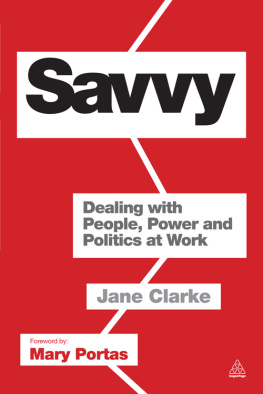Contents
About the Book
In his bestselling Affluenza, Oliver James examined the capitalist culture leaving so many of us unsatisfied with life. Now James is turning his microscope to the workplace in this fascinating expos of office politics.
With cutting-edge research and eye-opening interviews, James reveals the murky underside of modern office life. If you think you are judged on merit, think again. Its your ability to play the political game that counts. This culture has created a new breed of office monsters, willing to go to extraordinary lengths to succeed.
Exposing the devious practices that propel people to the top, James divulges strategies and techniques for triumphing over these difficult working environments. With the right mindset, you can distinguish and deal with toxic and overpromoted colleagues, charm your way through interviews and use office politics to your advantage.
Office Politics will overthrow your perceptions of office life and set you on a new path to success.
About the Author
Oliver James trained and practiced as a clinical child psychologist. Since 1988 he has worked as a writer, journalist, broadcaster and television documentary producer and presenter. His books include the bestselling They F*** You Up, Affluenza and Contented Dementia.
Also by Oliver James:
Affluenza
The Selfish Capitalist
Contented Dementia
Britain on the Couch
How Not to F*** Them Up
To John Cummins, Michael Jackson and David Macindoe (RIP),
whose thankless task it was to school me in office political skills
Introduction
Julles boss is a nightmare. He is surly and liable to lose his temper if anything is not exactly as he wants. He frequently blames her for his mistakes.
John has two employees who are at each others throats. He has tried to reconcile them by getting them together and having it out; he has tried talking to them individually. Nothing works.
Andrea wants a pay rise. Several others on the team do less work than her and bring less money into the business, yet they are paid more. When she points that out to her boss, he is not persuaded by her argument, and Andrea is left feeling resentful.
If you have similar everyday dilemmas, this book offers solutions. The first part explores what makes troublesome colleagues tick and suggests ways in which you can protect yourself against these types. The second part explains how office politics work and how to become better at them.
The expression office politics has got a bad name. We think of them as something undesirable, unwholesome, toxic. But, as you will see, they are far from bad, just an inevitable part of professional life. They must be embraced with as much humour, self-conscious deliberation and wisdom as possible.
On a daily basis, its absolutely unavoidable that people will find themselves in competition with one another. Interests at work frequently do not coincide. Resources, like the most stimulating tasks, the best shift hours or pots for bonuses, are finite. It is healthy for us to use our wiles to try and get the best of these for ourselves. At its simplest, thats all I mean by office politics: the normal wheezes everyone uses to advance their interests.
More precisely, researchers have identified four components of office political skill:
Astuteness: This is the foundation of being a good office politician: being able to read others, your organisation and yourself. If you cannot interpret the signals of people around you, theres little likelihood of you working out how to get your way. If you do not understand how your organisation works, you will be blundering about in the dark. If you are not clear what you want, how are you going to act in ways that will get it? You must try to be as astute as possible about others, your organisation and yourself.
Effectiveness: Having understood what is going on and made plans, you have to be skilled at executing them. That means knowing which combination of tactics to use, who to direct them at, choosing the right moment and performing the words and deeds effectively, always with some measure of actual thespianism deliberate pretences and acting.
Networking: Carefully nurtured relationships, within and beyond your organisation, enable you to press the right buttons. They build your reputation, oil wheels and are vital for moving between jobs.
The appearance of sincerity: The closer the fit between who you really are and who you come across as, the better. But quite often, the inner and the outer must necessarily be different in order for you to achieve successful management of the impression you are creating. You need to be able to do this in ways that seem sincere. If your colleagues have lost faith in your honesty and integrity, it will be hard to progress.
Defined as these four skills, my suggestion to you is that there is nothing wrong with office political activity. In fact, my ambition is to help you to become much more self-aware about your use of it. If you are someone who wants to believe that you should never try to advance your interests at the expense of others using these skills, I would plead with you to think again. You are almost certainly deceiving yourself: like it or not, one in five communications we have with others contain a white lie. Many lies are said to protect others feelings but some are necessary and healthy deceptions that advance our interests. If you can be more conscious of what you and others get up to, you will be much better able to do good for others, as well as yourself. Being shy or self-deceiving about this will only make you frustrated and resentful. You will be thwarted and outwitted by better operators. I am hoping to persuade you that there is nothing wrong with being a good office politician and improve your skills.
That does not mean I am advocating cold, selfish ruthlessness, far from it. I am not in favour of dog-eat-dog, self-preening career bestiality. Psychopaths, Machiavels and narcissists are rife in many sectors of the business world and its in your best interests to be able to identify them and develop strategies to effectively deal with them. The first part of this book is devoted to the fascinating new evidence regarding those kinds of people. It has been proven they are the sort most likely to be making your life hell at work. There are three kinds, which overlap:
Psychopaths: Highly impulsive thrill-seekers who lack empathy for others. Think Stalin and Gordon Gekko from the film Wall Street. They are four times commoner among senior executives than in the ordinary workforce.
Machiavels: Exceptionally calculating, they behave in a cold and manipulative fashion, ruthlessly pursuing their self-interest. Think Henry Kissinger and Peter Mandelson. People at or near the top have this trait much more than those lower down the food chain.
to be like this than ordinary people and, believe it or not, than mental hospital patients.
New evidence shows that people who have one of these tendencies are liable to possess the others. This Dark Triad of characteristics is very likely to be present in that person in your office who causes so much trouble.
The awful truth is that the number of such triadic people has greatly increased in the last thirty years, how much depending on which country you live in. The reason is because the global economy increasingly demands elements of triadic behaviour in order to succeed. This is especially true of English-speaking nations, like Britain and America, but also in emerging nations, like China, India and Russia. Frankly, its scary. Whether you work in the corporate sector, a small business or a public sector job, the system you are in is liable to reward ruthless, selfish manipulation. The likelihood of your daily working life being troubled by a person who is some mixture of psychopathic, Machiavellian and narcissistic is high. If you do not develop the skills to deal with them, they will eat you for breakfast.
Next page
